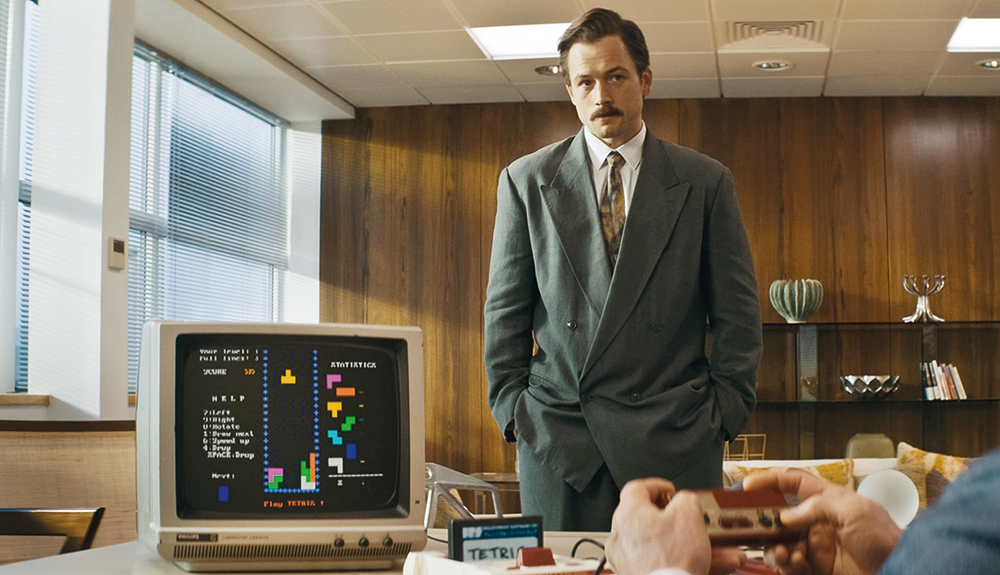Tetris is a righteously entertaining movie about the stampede to secure the rights from within the Soviet Union to what would become the world’s bestselling video game. The question you’re going to be asking yourself time and again – especially during the Lada-ZiL chase scene through the streets of Moscow in which our heroes try to elude the hatchet-faced KGB agents – is: ‘How much of this is true?’ And the honest answer is: ‘Not very much, actually.’
The star of the show has to be Roger Allam in a possibly career-best performance as Robert Maxwell
Yes, there is a game called Tetris (which has sold 520 million copies and which you’ve probably played: it’s the one where geometric objects fall from the sky and you have to rotate them so they land to form satisfyingly full, even rows). Yes, it was invented by a Russian, Alexey Pajitnov, a computer scientist at the Moscow Academy of Sciences who created it in his spare time in the summer of 1984. Yes, among those desperate to buy the rights were Robert Maxwell and his son Kevin, and an apparently amiable Dutch-American games designer Henk Rogers. But most of the caper element is the purest fantasy.
This, however, is both understandable and forgivable. Much of the drama depends on contractual small print (the technical definitions of console vs computer vs handheld device, etc.) and bureaucracy (negotiating capitalist deals in a collapsing communist economy). Endless boardroom meetings with lawyers do not a nail-biting plotline make. That’s why, quite rightly, scriptwriter Noah Pink and director Jon S. Baird have turned it into a video game-esque comedy drama replete with cartoonish villains and well-worn but always satisfying movie clichés, like the classy race-to-the-airport to get out of Dodge.
I loved it, as has everyone I know who has seen it. Taron Egerton (from Kingsman, whose director Matthew Vaughn co-produced Tetris and whose tongue-in-cheek influence is palpable throughout) is delightfully sympathetic as the tenacious Henk Rogers, who risks being beaten up and imprisoned by the KGB, and losing his home, in his desperate and inventive bids to get the game before the baddies do.
But the star of the show has to be Roger Allam in a possibly career-best performance as Robert Maxwell, plummy-voiced, imperious and impossibly devious. Maxwell – at least in this, possibly embellished, version of events – thinks that his high-level political contacts (he has a direct line to Gorbachev) and the offer of a quid-pro-quo publishing deal involving the rights to one of his dodgy encyclopedias will be enough to win the deal from the benighted Soviets, in the manner of paying natives for gold with beads. Kevin his son (played by Anthony Boyle) has (perhaps unfairly) been assigned the role of comedy foil: an arrogant buffoon undone by his epic sense of entitlement and lack of eye for detail. Toby Jones – in continuance of his project to be in absolutely every new film and TV show ever – has a fine cameo as yet another tricksy rival, Robert Stein.
The other vaudeville villain is, of course, Soviet Russia – with urban Scotland (where it was mostly filmed) doing a worryingly excellent job of impersonating grim, grey, 1980s Moscow, where every hotel line is bugged, every translator a KGB agent and you need to wait up to eight hours to get an international phone connection.
And the goodies comprise pretty much everyone on Team Henk Rogers. There’s his charming Japanese wife and daughters (who provide the statutory tear-jerking scenes where Dad is so immersed in business he misses his little girl’s heartwarming solo in a kimono at the school concert). And there’s the initially suspicious Pajitnov, who befriends Rogers, and introduces him to Moscow’s clandestine underground party scene, where everyone knows the words to subversive capitalist anthems like ‘The Final Countdown’. No more needs to be said: enjoy!







Comments